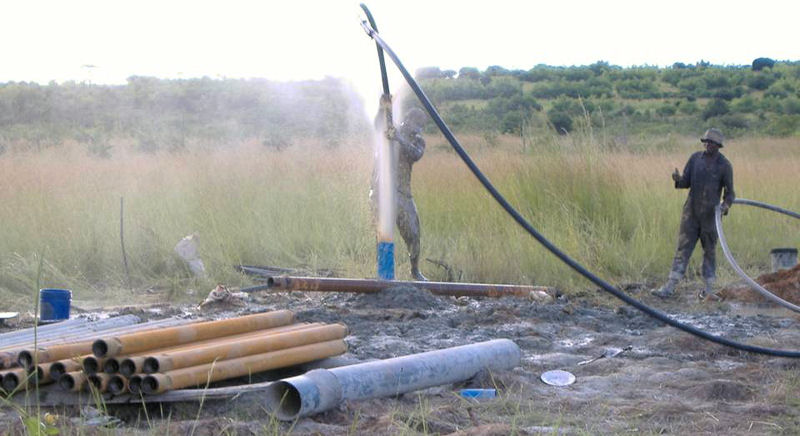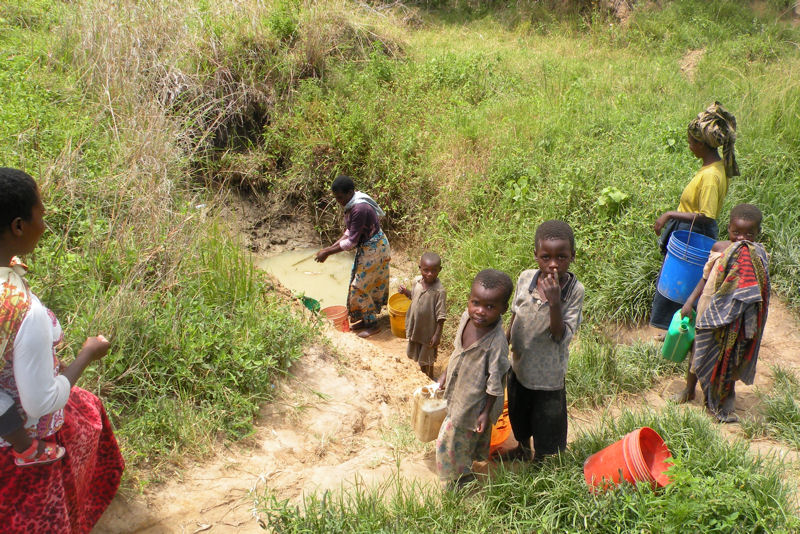
Water erupts from a well being drilled at a farm that provides food to the Daily Bread Life Ministries’ (Kidete, Tanzania) orphanage. Photo courtesy of Teleios Ministry (Greenville, S.C.).
Thirst and waterborne disease are daily threats for about 1 billion people worldwide who don’t have access to clean water, according to the World Health Organization (Geneva). Even though clean water is a prerequisite for health and economic activity, often it does not rank high on the agenda of aid agencies. However, a new well in a Tanzanian village shows how a small investment in water infrastructure can change lives by driving improvements in health, education, and economic well-being.
“In Africa, many diseases are waterborne. So if people can get clean water, then it is part of an improvement in health,” said Tanzanian President Jakaya Kikwete, during the 2014 World Economic Forum in January. Kikwete called on agencies to make access to clean water a priority, alongside education and health, since it underlies all development goals. Because of water scarcity in Africa, “women have to walk many miles for water,” he added.

Before the well was constructed women and children walked 10 to 15 miles (16 to 24 km) one way to collect water from depressions in fields. Photo courtesy of Teleios Ministry.
“In 2008, women in the village of Kidete were walking 10 to 15 miles [16 to 24 km] one way to get water from ditches and depressions in fields,” said Rebecca West, chief operating officer at Spartanburg Water (Spartanburg, S.C.) and past president of the Water Environment Federation (Alexandria, Va.). West visited Kidete, a village of subsistence farmers in arid central Tanzania, as a volunteer with the Christian charity, Teleios Ministry (Greenville, S.C.). Teleios Ministry works with the local Tanzanian clothes donation charity, Daily Bread Life Ministries, which had identified the need for a community well. “Seeking water had become a full-time job for most of the women and children of Kidete and the water was contaminated,” West said.
Assigned to oversee well construction, West quickly realized that her technical expertise was less important than listening to the community’s needs and developing connections with local officials. “I partnered with the Iringa Water District, the local water authority,” she said. Bonnie and Floyd Parker, directors of Teleios Ministry, enlisted the support of local politicians, easing the permitting process for the $25,000 well project.
In mid-2009, a local well driller installed a 76 m (250 ft) by 152 mm (6 in) borehole well that produces 1234 L/hr (326 gal/hr) of water. Lifted by an electric pump powered by a simple diesel generator, the water meets Tanzanian and U.S. drinking water standards. Initially, an attendant who lives onsite filled the 3785 L (1000 gal) water storage tank 3 times a day to serve the 700 residents of Kidete. Now, use has more than doubled to serve 2600 people in Kidete and neighboring villages, the Parkers said.
The clean reliable water irrigates a farm that provides food to the Daily Bread Life Ministries’ orphanage. Freed from searching for water, the women of Kidete formed a cooperative to sew Katenges, colorful traditional wraps, and sell vegetables at the market, the Parkers said. Village children now have time to attend school and disease incidence has dropped.
“It’s hard for those of us in a western country to see the impact that just because the village has a well, children go to school and the women can sell eggs and pigs and earn a sustainable income,” West said.
— Janet Pelley, WEF Highlights








March 26, 2014
Featured